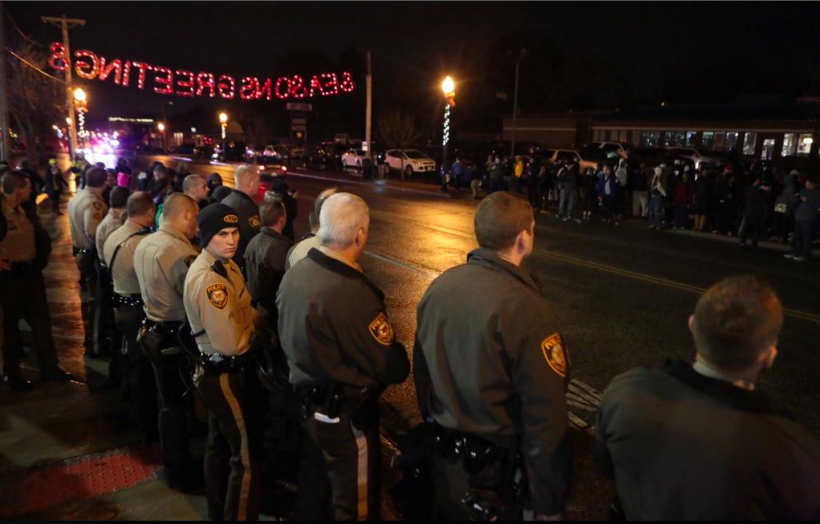
Credit: Twitter
Words feel impotent in the wake of last night’s devastating decision not to indict Darren Wilson for the murder of Mike Brown.
They feel puny, microscopic, almost void of value. They feel woefully inept, hollow, empty, lightyears away from the innovations we’d need even just to speak about the magnitude of the injustices of our country, at capturing the unimaginable grief of two parents who’ve had their son ripped from their loving arms, his killer walking free. Words feel so desperately inadequate as the blood of our fellow black citizens continues to flow, 12 year-old Tamir Rice executed by police just Saturday for playing with a BB gun—for indulging in the innocent play of a child.
But words are all we have. They are our tools to try to locate the path forward in this darkness, to a better world—one that inflicts less violence on us all. And so I shall try to find some on this bleak day.
I am white. I cannot know or even possibly begin to fathom the deep, eviscerating pain of the systemic racial dehumanization of people of color within our society. It is beyond me, given the huge privileges the world affords me based solely on the color of my skin, to comprehend the visceral pain so many in our country face every day just existing in our world. The unconscionable legacy of slavery and uncountable racial failings of our culture I am immune from.
I acknowledge this. I acknowledge my limitations to fully understand, to feel it. But I also acknowledge the tremendous importance of listening to and reading the work of those who do. This is, in fact, my role: to listen, to learn, to offer space to marginalized voices, to amplify those who are downtrodden by the vicious injustices of our violent societal order.
And as a feminist, I am committed to the creation of a more equitable world. As I wrote in August, utterly transfixed night after night by the horrors of Ferguson, that Ferguson is at the beating heart of what the feminist movement purports to be about.
Ferguson is a feminist and reproductive justice issue—one all feminists should rally around.
A black man is killed by a police officer or vigilante every 28 hours in this country. Black Americans are imprisoned at six times the rate of whites—in fact, there is a 70% chance that a black man without a high school diploma will be imprisoned by his mid-thirties.
Police officers are supposed to “protect and serve,” but a quick look to Oklahoma City police officer Daniel Holtzclaw, who targeted women of color for brutal sex crimes knowing he was less likely to face any kind of punishment because of the marginalization of their voices, reveals that our “justice system” does not serve us all equally.
Black Americans are systematically profiled. They are killed for listening to loud music, for trekking to a convenience store for Skittles, for shopping at Walmart.
Night after night, black parents across our nation sit their children down for “the talk,” a devastating and desperate conversation about what they can do to avoid a negative—potentially deadly—interaction with the police.
From “Don't wear a hoodie,” to “Don't talk back to cops,” to “Don't ask for help,” the underlying message is the same: Do as little as you can to give them a “reason” to kill you.
In our country, mothers write stories like Stacia L. Brown’s gut-wrenching “When Parenting Feels Like A Fool’s Errand.”
It is incontrovertible: The plight of a parent raising a black child in our nation is filled with terror, anxiety, grief.
And it is this, our society’s inherent hostility to black life, that makes Ferguson a feminist issue. Reproductive justice speaks to people having the right to make a choice about how and when they want to bear children.
To be committed to feminism, to reproductive justice, is not just to ensure that we all have access to abortion. It is to work toward a society where all people feel secure exercising their right to build a family, "to parent the children we have in safe and healthy environments."
As Michaela Angela Davis writes in her piece "Black moms shouldn't have to have 'the talk'":
"The burden has far too long been shouldered by black parents and kids, requiring them to adjust to the injustice of excessive force, police brutality and ignorance."
She is right. The burden is all of ours.
My esteemed colleague, Jetta Rae, elaborates on the issue, on the incredible importance of Ferguson and our commitments to it as feminists, in a compelling, must-see video below.






